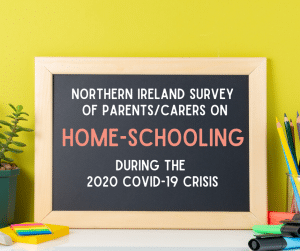Report: Home-Schooling in Northern Ireland during the COVID-19 Crisis

The past few months have been utterly remarkable. They have: forced parents/carers to assume a greater role than ever before in their child/ren’s education; tested schools and teachers to their limits in terms of adapting fast to providing (mostly online) resources for home learning; and thrown children into a new, confined online learning environment at home. All amid a broader context of fear and uncertainty caused by a global pandemic.
Despite the upheaval, it is vital that our children’s education and our families’ wellbeing is monitored and understood by policymakers, service providers, and the research community. It is likely that the shutdown is leading to widening educational inequality. The Centre for Research in Educational Underachievement ran an online survey on parents/carers’ experiences of home-schooling during the lockdown in early May 2020, which received over 2000 responses from across Northern Ireland. The survey asked how parents/carers were approaching home-schooling, how schools were supporting them, and what could be done to better support their households.
Click here to download the full report, and read below for a summary of the key findings.
1. Parental education and employment status make a big difference
The level of parental education and employment status appears to mediate a strong divergence in experience. Parents/carers educated to university level are over 4 times more likely to be working from home than parents/carers with no qualifications, who are much more likely to have been furloughed. Those with university-level education are the most likely to become directly involved in their children’s home-schooling through teaching them directly (26.7%) or actively supporting their children’s learning (52.6%). In contrast, parents/carers without a degree are more likely to report lower levels of confidence in managing home-education, and to report simply ‘monitoring’ their child’s learning.
2. Essential Workers are least able to devote time to home-schooling
This survey highlights the particular challenges faced by Essential Workers. They are least likely to engage directly in their child/ren’s home-schooling (e.g. least likely to teach or actively support their learning) and are most likely to encourage their child/ren to learn independently as a result of having to work shifts outside the home. Essential Workers are often working longer hours than before and are at greatest risk of becoming infected with the COVID-19 virus. While not universal among the group of Essential Workers, the strongest expressions of frustration and desperation came from within this group, struggling with physical exhaustion, fear of infection, an inability to spend as much time with their children to support their learning, and, in several cases, a resulting sense of guilt and anger.
3. Parents/Carers are calling for live teaching and pre-printed resources
Almost a quarter of respondents do not have a printer, and many expressed a desire for more printed packs of work to be provided and complained of the costs incurred in providing printer ink and paper. We also found that only half of children have their own device to access online resources for schoolwork.
When asked for a single recommendation to improve home-schooling, parents/carers’ most common call was more live interaction with teachers. This could be for as little as twenty minutes once a week, either to introduce new curricular topics, or (especially with younger children) to allow some peer or pastoral interaction to raise motivation levels. We acknowledge the valid concerns of teaching unions and school leaders around the safeguarding of children and teachers, and encourage creative thinking about how the benefits of teacher/pupil interaction may be achieved safely.
4. Lockdown is affecting each child differently
The study provides some insights into children’s experiences of the lockdown learning period. Older children tend to prefer learning at school (and miss school more) while younger children are more likely to prefer the home environment. Most parents/carers suggest that children’s social skills and behaviour haven’t changed since schools closed. The area where children are most likely to have benefited is in their emotional well-being, where around 1 in 5 claim that there has been an improvement. By contrast, 3 in 5 claim that their child/ren’s level of motivation to learn has become worse since home-schooling began. Overall, we observe a very broad range of experiences, from accounts of more relaxed children enjoying peaceful family time and playing outside or engaging in many different leisure activities within the home, to children who are missing their friends and their teachers, struggling to learn, and falling further behind their peers.
“It’s flipping hard work”
The purpose of this report is not to ascribe blame, to undermine professional reputations, or to expose individuals. We share a joint responsibility to improve the situation for everyone, especially those disadvantaged by this continued period of home-schooling.
To quote some respondents, it is clear that for many engaged in home-schooling, “it’s flipping hard work”. “The novelty has worn off”, and “Nobody chose this”. Let us hope that we can learn the lessons of the past eight weeks so that all children can learn more successfully, happily and equitably for the remainder of the lockdown period and beyond.
Reasons to study at Stranmillis
Student Satisfaction
Stranmillis is ranked first in Northern Ireland for student satisfaction.
Work-based placements
100% of our undergraduate students undertake an extensive programme of work-based placements.
Study Abroad
All students have the opportunity to spend time studying abroad.
Student Success
We are proud to have a 96% student success rate.
